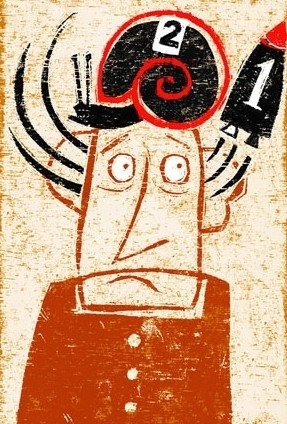
Books and Arts; Book Review;Human decision-making; Not so smart now;
Thinking Fast and Slow, by Daniel Kahneman.
Towards the end of “Thinking, Fast and Slow”, Daniel Kahneman laments that he and his late collaborator, Amos Tversky, are often credited with showing that humans make “irrational” choices. That term is too strong, he says, to describe the variety of mental mishaps to which people systematically fall prey. Readers of his book may disagree. Mr Kahneman, an Israeli-American psychologist and Nobel economics laureate, has delivered a full catalogue of the biases, shortcuts and cognitive illusions to which our species regularly succumbs. In doing so he makes it plain that Homo economicus—the rational model of human behaviour beloved of economists—is as fantastical as a unicorn.
In one experiment described by Mr Kahneman, participants asked to imagine that they have been given 50 pound behave differently depending on whether they are then told they can “keep” 20 pound or must “l(fā)ose” 30 pound—though the outcomes are identical. He also shows that it is more threatening to say that a disease kills “1,286 in every 10,000 people”, than to say it kills “24.14% of the population”, even though the second mention is twice as deadly. Vivid language often overrides basic arithmetic.
Some findings are downright peculiar. Experimental subjects who have been “primed” to think of money, perhaps by seeing a picture of dollar bills, will act more selfishly. So if someone nearby drops some pencils, these subjects will pick up fewer than their non-primed counterparts. Even obliquely suggesting the concept of old age will inspire people to walk more slowly—though feeling elderly never crossed their mind, they will later report.
After all this the human brain looks less like a model of rationality and more like a giddy teenager: flighty, easily distracted and lacking in self-awareness. Yet this book is not a counsel of despair. Its awkward title refers to Mr Kahneman's two-tier model of cognition: “System 1” is quick, intuitive and responsible for the quirks and mistakes described above (and many others). “System 2”, by contrast, is slow, deliberative and less prone to error. System 2 kicks in when we are faced with particularly complex problems, but much of the time it is all too happy to let the impulsive System 1 get its way. (Readers may be reminded of Freud's “id” and “superego”, though Mr Kahneman never mentions this particular intellectual ancestor.)
What, then, is System 1 good for? Rather a lot, it turns out. In a world that often demands swift judgment and rapid decision-making (fight or flight?), a creature who solely relied on deliberative thinking wouldn't last long. Moreover, System 1 generally works well. As Mr Kahneman says, “most of our judgments and actions are appropriate most of the time”. He urges readers to counteract what he considers to be mistakes of System 1 thinking, such as the “l(fā)oss aversion” that deters people from accepting favourable gambles (such as a 50-50 chance to win 200 dollar or lose 100 dollar). He also recommends checking the performance of an investment portfolio no more than once a quarter, to limit needless anguish over short-term fluctuations and the “useless churning” of shares.
Mr Kahneman does not dwell on the possible evolutionary origins of our cognitive biases, nor does he devote much time to considering why some people seem naturally better at avoiding error than others. Still this book, his first for a non-specialist audience, is a profound one. As Copernicus removed the Earth from the centre of the universe and Darwin knocked humans off their biological perch, Mr Kahneman has shown that we are not the paragons of reason we assume ourselves to be. Often hailed as the father of behavioural economics (with Tversky as co-parent), his work has influenced a range of disciplines and has even inspired some policy.
But the true consequences of his findings are only starting to emerge. When he presents the poor victims of his experiments with conclusive proof of their errors, the typical reaction is not a chastened pledge to shape up, but confused silence, followed by business as usual. No one likes to be told he is wrong.











